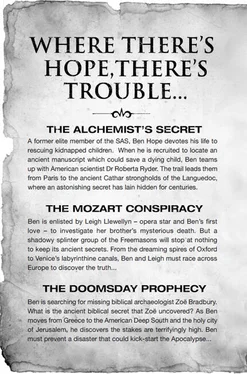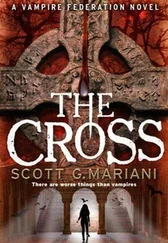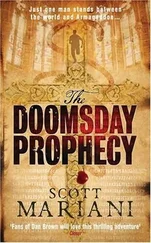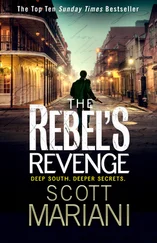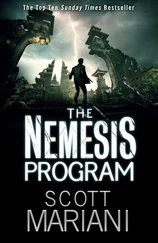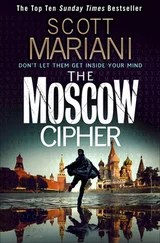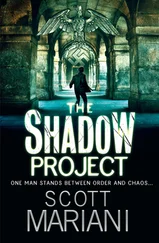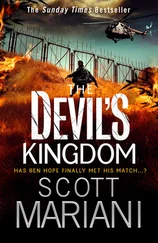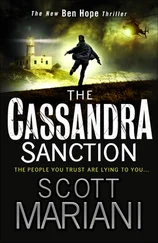‘Hot stuff’, he’d called it. And he hadn’t been kidding.
The detached, unemotionally scholarly part of Cabeza’s mind that wasn’t paralysed with terror regretted that he’d never be able to see the project through. Once Forsyte had let him see the precious documents his job would have been to cast his historian’s eye over them, help to break the last bits of code, translate the sixteenth-century Spanish into modern English and generally confirm Forsyte’s own initial findings. Once the work was complete, which Cabeza didn’t think would have taken very long, it would have been a simple matter of releasing the information to a stunned world. Hidden treasures were ten a penny; earth-shaking scandalous revelations about important historical figures were not. And there were fourteen of them here to expose.
The one document that Forsyte had been willing to show Cabeza a copy of prior to their meeting was the land grant awarded in June 1588 by King Philip of Spain. Age and damp had eaten away at its edges, but otherwise it had been as miraculously preserved as the rest of the papers and was extremely valuable in its own right. Resplendent in crimson and gold, it bore the royal signature clearly at the bottom; above, as legible as the day it had been penned, was inscribed the name of the man the King had seen fit to reward with such a handsome gift. It was a name that Cabeza and every other historian for more than five hundred years had known well: a notorious one at that.
In his day, Sir Christopher Pennick had been a highly influential nobleman whose connections within both Parliament and the Court of Queen Elizabeth I had been virtually second to none. It had been said that he had the Queen’s ear on many delicate matters of state policy, and only had to whisper into it to inform some of Her Majesty’s most key decisions. But Elizabeth’s trusted aide had also been a man with a dark secret.
At a time when the Church of Rome was about as accepted in England as Satan and to be Catholic was a serious impediment to one’s prospects, Sir Christopher had wisely revealed his own strong popish leanings to nobody except his wife Anne and a select circle of friends. But his secrecy ran deeper than even Anne knew: when her beloved husband wasn’t attending to matters at Court or hunting wild boar on his lands, which stretched from Hambledon to Winchester, he was active in a clandestine movement devoted to the restoration of the Roman Church in England.
When the undeclared Anglo–Spanish War of 1585 began, Sir Christopher and his associates realised that a Spanish victory would make their dream of a Catholic England possible. So, for the next three years, Pennick had used his high-level connections to feed valuable state secrets to the Spanish intelligence network that by the late 1580s had worked its tentacles deep into the British establishment. He quickly became a glittering asset to Spain, cultivating his own stable of dedicated agents within both Court and Parliament. For almost three years his treachery went completely undetected. It was little wonder, in hindsight, that such a valuable and clever agent had been so handsomely rewarded by King Philip.
By the summer of 1588, thanks in part to the efforts of Sir Christopher and his web of spies, the mass invasion of England by Spanish forces was finally ready to launch. But had the Armada managed to reach British shores, let alone achieved its dizzy goal of landing enough Spanish troops to take over the whole country and overthrow Queen Elizabeth’s rule, Pennick would still never have received his reward. Even as the massive invasion fleet was setting sail from Lisbon, an anonymous tip-off alerted Elizabeth’s notorious and feared spymaster, Sir Francis Walsingham, to Sir Christopher’s activities. Pennick was swiftly, secretly arrested for treason and imprisoned in the Tower of London, while Walsingham’s counterintelligence disinformation machine spread the temporary rumour that he’d been taken ill with smallpox.
The more gruesome historical accounts showed that Pennick had resisted even the most hideous and barbarous forms of torture devised by Walsingham’s men to make him reveal the names of his fellow intelligence agents. Burned, mutilated, his body pierced and broken on the rack, he kept his mouth shut to the end. By the time he died, his wife Anne wouldn’t have been able to recognise him. Meanwhile, the Armada was being repelled and soundly defeated by a combination of the Royal Navy and bad weather. It was a near-run thing, as close as England would ever again come to being invaded. When the Santa Teresa went down off the northwest coast of Catholic Ireland during that last-ditch attempt to find a safe port so far from home, the land grant Sir Christopher Pennick would never know about went to the bottom with her.
After his death, the traitor was dismembered and his body parts put on public display across London as an example to others. His widow Lady Anne Pennick, according to some historical sources heavily pregnant with their first child, fled England in heartbreak and disgrace, never to be seen again. As for Pennick’s network of Spanish agents in England, their names were a secret he carried with him to his grave.
Until now.
As Forsyte had known, and as Cabeza still knew, those very names were listed in code in the secret documents that had been aboard the Santa Teresa . It seemed ironic that in doing their bit to scupper the Armada, the Royal Navy had deprived the British Government of the most valuable piece of intelligence they could have hoped for during the war. The staggering line-up of Pennick’s treacherous allies in England included seven senior politicians, three high-ranking army officers, one rear admiral and one disgruntled lesser member of the royal family. Fourteen names in all, each of them very well known indeed to modern-day historians, not one of them ever even vaguely suspected of anything less than total allegiance to their country.
Yet there it was, black on white proof of their unspeakable treason, enough to have sent them to the Tower back in 1588 and still enough to cause shockwaves even now. The historical time bomb was set to explode. Forsyte had had it all planned: the media storm, the million-pound book deal, the eight-part TV documentary called ‘Hidden Traitors’.
What a splendid coup it would have been, Cabeza reflected wistfully as he ambled through the village. He’d been as impatient as Forsyte, though for slightly purer academic reasons, to witness the impact of their revelations.
But that would never happen now. Was it really possible that someone out there would commit murder to protect the secret of Sir Christopher’s treachery? Cabeza couldn’t understand it. All he knew was that Forsyte was dead and there were people out to get him, too. It was all a horrible mess and he was frightened and shaken and edgy, unable to sleep at night and with nothing to occupy him all day, sitting around at La Catalina with nothing to do but fret and feel sorry for himself.
So he was extremely relieved to be able to get out and pay a visit to the Iglesia de la Villa. Not his primary area of interest historically – or else he would surely have discovered it years ago, living just a few hours’ drive away – but he was convinced that an afternoon spent wandering around the church and the Moorish castle ruins around it would help him forget his troubles, if only for a little while.
He strolled on through the streets of Montefrio, pausing now and then to admire the walled gardens with their palm trees, pretty even in winter, the decorative balconies and street lamps and the old architecture, but never losing sight of the looming church tower which got steadily closer as he threaded his way through the dense maze of narrow streets.
Читать дальше
Конец ознакомительного отрывка
Купить книгу
